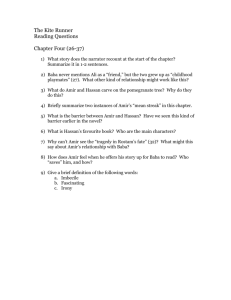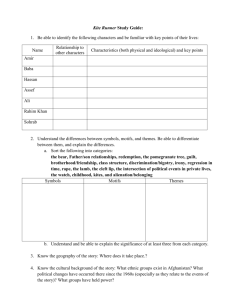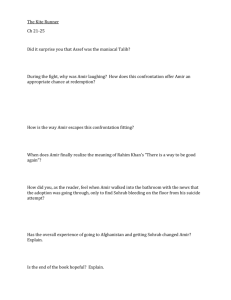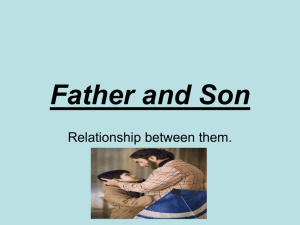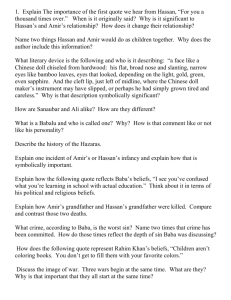Notes
advertisement
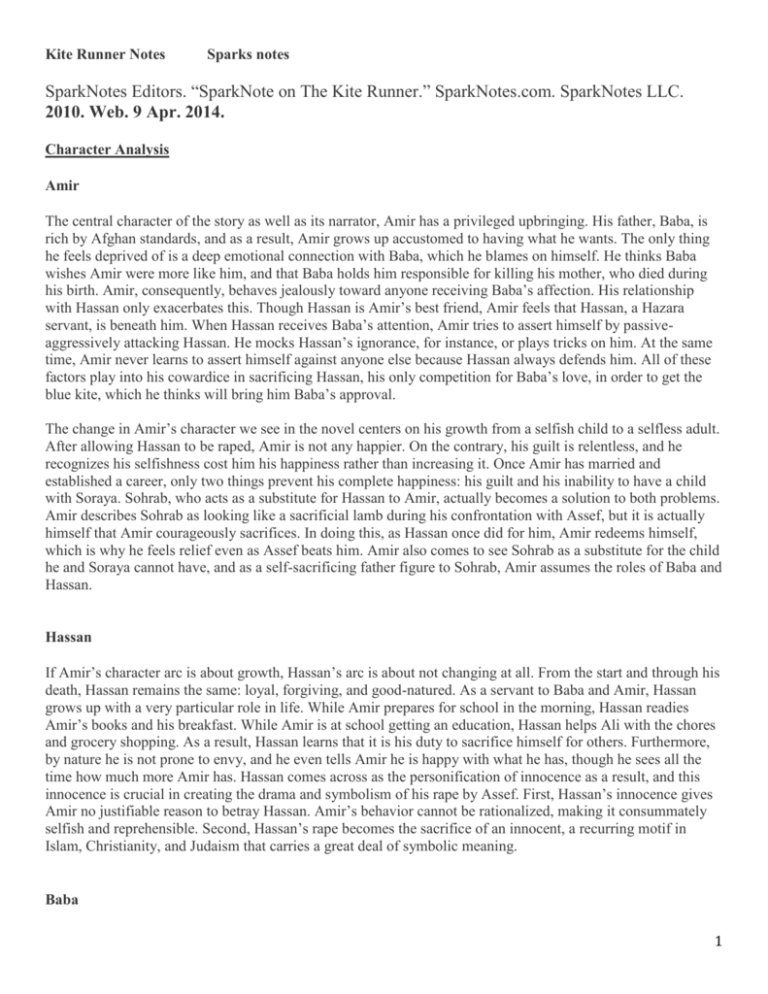
Kite Runner Notes Sparks notes SparkNotes Editors. “SparkNote on The Kite Runner.” SparkNotes.com. SparkNotes LLC. 2010. Web. 9 Apr. 2014. Character Analysis Amir The central character of the story as well as its narrator, Amir has a privileged upbringing. His father, Baba, is rich by Afghan standards, and as a result, Amir grows up accustomed to having what he wants. The only thing he feels deprived of is a deep emotional connection with Baba, which he blames on himself. He thinks Baba wishes Amir were more like him, and that Baba holds him responsible for killing his mother, who died during his birth. Amir, consequently, behaves jealously toward anyone receiving Baba’s affection. His relationship with Hassan only exacerbates this. Though Hassan is Amir’s best friend, Amir feels that Hassan, a Hazara servant, is beneath him. When Hassan receives Baba’s attention, Amir tries to assert himself by passiveaggressively attacking Hassan. He mocks Hassan’s ignorance, for instance, or plays tricks on him. At the same time, Amir never learns to assert himself against anyone else because Hassan always defends him. All of these factors play into his cowardice in sacrificing Hassan, his only competition for Baba’s love, in order to get the blue kite, which he thinks will bring him Baba’s approval. The change in Amir’s character we see in the novel centers on his growth from a selfish child to a selfless adult. After allowing Hassan to be raped, Amir is not any happier. On the contrary, his guilt is relentless, and he recognizes his selfishness cost him his happiness rather than increasing it. Once Amir has married and established a career, only two things prevent his complete happiness: his guilt and his inability to have a child with Soraya. Sohrab, who acts as a substitute for Hassan to Amir, actually becomes a solution to both problems. Amir describes Sohrab as looking like a sacrificial lamb during his confrontation with Assef, but it is actually himself that Amir courageously sacrifices. In doing this, as Hassan once did for him, Amir redeems himself, which is why he feels relief even as Assef beats him. Amir also comes to see Sohrab as a substitute for the child he and Soraya cannot have, and as a self-sacrificing father figure to Sohrab, Amir assumes the roles of Baba and Hassan. Hassan If Amir’s character arc is about growth, Hassan’s arc is about not changing at all. From the start and through his death, Hassan remains the same: loyal, forgiving, and good-natured. As a servant to Baba and Amir, Hassan grows up with a very particular role in life. While Amir prepares for school in the morning, Hassan readies Amir’s books and his breakfast. While Amir is at school getting an education, Hassan helps Ali with the chores and grocery shopping. As a result, Hassan learns that it is his duty to sacrifice himself for others. Furthermore, by nature he is not prone to envy, and he even tells Amir he is happy with what he has, though he sees all the time how much more Amir has. Hassan comes across as the personification of innocence as a result, and this innocence is crucial in creating the drama and symbolism of his rape by Assef. First, Hassan’s innocence gives Amir no justifiable reason to betray Hassan. Amir’s behavior cannot be rationalized, making it consummately selfish and reprehensible. Second, Hassan’s rape becomes the sacrifice of an innocent, a recurring motif in Islam, Christianity, and Judaism that carries a great deal of symbolic meaning. Baba 1 In his words and actions, Baba sets the moral bar in the novel. When Amir is a boy, Baba’s major concern about him is that he doesn’t have the courage to stand up for himself, demonstrating that Baba places great value on doing what is right. If Amir cannot take of himself as a boy, he worries, he will not have the strength to behave morally as an adult. Baba follows through on these beliefs in his own behavior. When he and Amir flee Kabul, he is willing to sacrifice his life to keep the Russian guard from raping the woman with them, and in doing so he sets the example that Amir will follow later when he must choose between saving himself or doing what he knows to be right. What the reader sees of Baba from Amir’s narrative is not the full story, however. As Amir describes him, he is proud, independent, determined, but sometimes emotionally distant and impatient. We learn from a note Rahim Khan writes to Amir toward the end of the book that Baba was a man torn between two halves, specifically between Amir and Hassan. Amir never sees Baba’s inner conflict because Baba has very much separated his outward appearance from his internal emotions. For instance, Baba builds an orphanage, which appears to be a simple act of charity. But as Rahim Khan explains, Baba built the orphanage to make up for the guilt he felt for not being able to acknowledge Hassan as his son. Baba’s hesitation to reveal his emotions causes Amir to feel that he never knows Baba completely, alienating Amir from Baba while Amir is growing up. The move to America is very difficult for Baba, who is used to being wealthy and well-respected in his community. He goes from having wealth and a position of power to working a low-paying job at a gas station and living modestly. Yet his relationship with Amir improves. Baba, as Rahim Khan explains in his note, felt guilty over his rich, privileged life because Hassan was not able to share in it. When he no longer has his wealth, his guilt diminishes, and with Hassan not around, he is not straining uncomfortably to act one way with Amir and another with Hassan. As a result, he is able to open up more with Amir, and the two grow much closer in Baba’s final years. Despite the fact that he lost everything he had as a refugee, he dies genuinely happy, feeling proud of Amir and perhaps happy that he was able to build the relationship he always wanted with at least one of his sons. Themes The Search For Redemption Amir’s quest to redeem himself makes up the heart of the novel. Early on, Amir strives to redeem himself in Baba’s eyes, primarily because his mother died giving birth to him, and he feels responsible. To redeem himself to Baba, Amir thinks he must win the kite-tournament and bring Baba the losing kite, both of which are inciting incidents that set the rest of the novel in motion. The more substantial part of Amir’s search for redemption, however, stems from his guilt regarding Hassan. That guilt drives the climactic events of the story, including Amir’s journey to Kabul to find Sohrab and his confrontation with Assef. The moral standard Amir must meet to earn his redemption is set early in the book, when Baba says that a boy who doesn’t stand up for himself becomes a man who can’t stand up to anything. As a boy, Amir fails to stand up for himself. As an adult, he can only redeem himself by proving he has the courage to stand up for what is right. The Love and Tension Between Fathers and Sons Amir has a very complex relationship with Baba, and as much as Amir loves Baba, he rarely feels Baba fully loves him back. Amir’s desire to win Baba’s love consequently motivates him not to stop Hassan’s rape. Baba has his own difficulty connecting with Amir. He feels guilty treating Amir well when he can’t acknowledge Hassan as his son. As a result, he is hard on Amir, and he can only show his love for Hassan indirectly, by 2 bringing Hassan along when he takes Amir out, for instance, or paying for Hassan’s lip surgery. In contrast with this, the most loving relationship between father and son we see is that of Hassan and Sohrab. Hassan, however, is killed, and toward the end of the novel we watch Amir trying to become a substitute father to Sohrab. Their relationship experiences its own strains as Sohrab, who is recovering from the loss of his parents and the abuse he suffered, has trouble opening up to Amir. The Intersection of Political Events and Private Lives The major events of the novel, while framed in the context of Amir’s life, follow Afghanistan’s transitions as well. In Amir’s recollections of his childhood, we see the calm state of Kabul during the monarchy, the founding of the republic, and then watch as the Soviet invasion and infighting between rival Afghan groups ruin the country. These events have a hand in dictating the novel’s plot and have significant effects on the lives of the characters involved. The establishment of the republic gives Assef an opportunity to harass Amir, simply because Assef’s father knows the new president. Later, Kabul’s destruction forces Baba and Amir to flee to California. When the Taliban take over after that, they murder Hassan and even give Assef a position that lets him indulge his sadism and sexual urges without repercussions. Both of these events factor into Amir’s mission to save Sohrab and his redemption by confronting Assef, subtly implying that Afghanistan will similarly have its own redemption one day. The Persistence of the Past All the characters in the novel feel the influence of the past, but none so much as Amir and Sohrab. In Sohrab’s case, his past has been so traumatizing that it affects all his behavior. The prolonged physical and sexual abuse he endured makes him flinch anytime Amir touches him. He also fears the abandonment he experienced when his parents died so much that he attempts suicide when Amir says he may have to go back to an orphanage. For Amir, the past is always with him, from the book’s first sentence, when he says he became what he is today at the age of twelve, to its final sentence. That’s because Amir defines himself by his past. His feelings of guilt for his past actions continue to motivate him. Amir even feels responsible for the Taliban murdering Hassan because he thinks he set in motion the events that led to Hassan’s death when when he pushed Hassan and Ali out of Baba’s house. As he says on the book’s first page, the past can never be buried. Motifs Rape Rape recurs throughout the novel. The most significant instances of rape are Assef’s rape of Hassan and his later rape of Sohrab. Hassan’s rape is the source of Amir’s guilt, which motivates his search for redemption, while stopping Sohrab’s rape becomes Amir’s way of redeeming himself. In each case, rape is a critical element in the novel’s plot. Other instances of rape include Baba stopping the rape of the woman in the truck with them as they flee Kabul, and the rape of Kamal that Kamal’s father implies. As a motif, rape is important for multiple reasons. It is not just physically violent, but it is also an attack on the victim’s emotions and dignity. Rape in this sense represents complete physical and mental domination of those who don’t have power by those who do, and the victims of rape that we see in the novel, most notably Hassan and Sohrab, always suffer lasting emotional trauma. Irony The adult Amir clearly recognizes the ironies in his own story. He even describes how Rahim Khan tells him 3 when is still a child that he has grasped irony in his writing. The novel’s greatest irony, and its most tragic, centers on Amir’s choice not to stop Hassan’s rape. Amir doesn’t intervene because he wants Baba’s approval, which he knows he can earn by bringing home the kite and proving that he, like Baba, is a winner. But by not stopping Assef and the others, Amir becomes exactly the sort of coward Baba worried Amir would become, and unwittingly allows Baba’s son—and his own brother—to be raped, as he does not yet know that Baba is Hassan’s father. Amir ultimately wants to be happy, but instead he earns himself an overwhelming sense of guilt. There is a further irony in the fact that Amir only realizes how much he resembles Baba when he discovers that Baba conceived Hassan with Sanaubar, Ali’s wife. Amir wants to share the best of Baba’s traits, but instead what they share is the betrayal of their best friends. Another significant irony is the fact that Assef, who raped Hassan and caused Amir’s guilt, becomes the way for Amir to atone. Amir is emotionally healed by taking the beating Assef gives him. In each instance, the irony stems from Amir recognizing the unintended consequences of his actions or desires. Regressing in Time Amir does not exactly have flashbacks, which would suddenly put him back in the midst of an earlier event. Instead he repeatedly moves the story back in time to give a history of what he is talking about. The novel begins with him living in San Francisco, for instance, then immediately jumps back to his childhood in Kabul. Shortly after that, he jumps back yet again, this time to Baba’s and Ali’s childhood. When he meets Rahim Khan in Pakistan, Rahim Khan starts his own story by going back in time and telling Amir what Hassan’s life has been like. Amir tells his story to a reader who has no knowledge of any of this beforehand, and his choice to regress in time and give the back story of each character does two things: it provides critical information about the character’s history, and it also reinforces the thematic idea that the past defines the present. Symbols The Cleft Lip Hassan’s cleft lip is one of his most representative features as a child, and it is one of the features Amir refers to most in describing him. The split in Hassan’s lip acts as a mark of Hassan’s status in society. It signifies his poverty, which is one of the things that separates him from Amir, simply because a cleft lip indicates that he and his family do not have the money to fix the deformity. Baba, who is Hassan’s biological father, chooses to pay a surgeon to repair Hassan’s lip as a birthday gift, signifying his secret fatherly love for Hassan. Later, Assef splits Amir’s lip as he beats him, leaving Amir with a permanent scar much like Hassan’s. In a sense, Amir’s identity becomes merged with Hassan’s. He learns to stand up for those he cares about, as Hassan once did for him, and he becomes a father figure to Sohrab. Because of this, it also serves as a sign of Amir’s redemption. Kites The kite serves as a symbol of Amir’s happiness as well as his guilt. Flying kites is what he enjoys most as a child, not least because it is the only way that he connects fully with Baba, who was once a champion kite fighter. But the kite takes on a different significance when Amir allows Hassan to be raped because he wants to bring the blue kite back to Baba. His recollections after that portray the kite as a sign of his betrayal of Hassan. Amir does not fly a kite again until he does so with Sohrab at the end of the novel. Because Amir has already redeemed himself by that point, the kite is no longer a symbol of his guilt. Instead, it acts as a reminder of his childhood, and it also becomes the way that he is finally able to connect with Sohrab, mirroring the kite’s role in Amir’s relationship with Baba. 4 The Lamb In Islam, as in Christianity, the lamb signifies the sacrifice of an innocent. Amir describes both Hassan and Sohrab as looking like lambs waiting to be slaughtered. Amir says this during Hassan’s rape, noting that Hassan resembled the lamb they kill during the Muslim celebration of Eid Al-Adha, which honors Abraham’s near sacrifice of his son for God. Similarly, he describes Sohrab as looking like a slaughter sheep when he first sees Sohrab with Assef. Assef and the others had put mascara on Sohrab’s eyes, just as Amir says the mullah used to do to the sheep before slitting its throat. Both Hassan and Sohrab are innocents who are figuratively sacrificed by being raped, but these sacrifices have very different meanings. In Hassan’s case, Amir sacrifices him for the blue kite. But in Sohrab’s case, Amir is the one who stops his sexual abuse. In this context, sacrifice is portrayed as the exploitation of an innocent. Important Quotations Explained 1. “That was a long time ago, but it’s wrong what they say about the past, I’ve learned, about how you can bury it. Because the past claws its way out. Looking back now, I realize I have been peeking into that deserted alley for the last twenty-six years.” At the outset of Chapter 1, just as the book begins, Amir writes these words. With them, he hints at the central drama of the story and the reason he is telling it. To the reader, the quotation functions as a teaser. It piques the reader’s interest without revealing exactly what Amir is talking about, and from the time period Amir mentions, twenty-six years, the reader gets an idea of just how important this moment was. As the story unfolds, we realize that the deserted alley Amir refers to is where Hassan was raped, and that this event has largely defined the course of Amir’s life since. This is what Amir means when he says that the past continues to claw its way out. Try as he might to bury it, he was unable to because his feelings of guilt kept arising. As a result, he figuratively continues peeking into the alley where Assef raped Hassan, literally meaning that he keeps going over the event in his mind. 2. “A boy who won’t stand up for himself becomes a man who can’t stand up to anything.” Baba says these words to Rahim Khan while he is talking about Amir at the end of Chapter 3, and the quotation reveals important traits in both Amir and Baba. With these words, Baba sums up one of Amir’s major character flaws—his cowardice—and Baba shows how much value he places in standing up for what is right. Baba is reluctant to praise Amir, largely because he feels Amir lacks the courage to even stand up for himself, leaving Amir constantly craving Baba’s approval. Amir’s desire for this approval as well as his cowardice later cause him to let Assef rape Hassan. The quotation also foreshadows the major test of Amir’s character that occurs when he must decide whether to return to Kabul to save Sohrab. As Amir searches for redemption, the question he struggles with is precisely what concerned Baba: does he have the courage and strength to stand up for what is right? 3. “Huddled together in the dining room and waiting for the sun to rise, none of us had any notion that a way of life had ended.” (p. 36) This quotation occurs at the beginning of Chapter 5, as Ali, Hassan, and Amir hide inside from the gunfire they hear in the street that signals the coup by Daoud Khan, which ended Afghanistan’s monarchy. Though the 5 effects of this coup were not immediately apparent, the coup ushered in an era of political instability that would essentially ruin Afghanistan. The way of life Amir refers to is the lifestyle that he, Baba, Ali, and Hassan knew before the coup, when Kabul was still safe and stable. For Amir in particular this meant a relatively idyllic life spent going to school, flying kites, and playing with Hassan, made possible because Baba was wealthy. But in the years after the night Amir describes when the coup occurred, violence and murder plagued the city, forcing Baba and Amir to leave Afghanistan and with it everything they owned. As a result, almost overnight everything Amir knew growing up in Kabul changed. 4. “I actually aspired to cowardice, because the alternative, the real reason I was running, was that Assef was right: Nothing was free in this world. Maybe Hassan was the price I had to pay, the lamb I had to slay, to win Baba.” When Amir says this, toward the end of Chapter 7, he has just watched Assef rape Hassan,and rather than intervene, he ran away. Amir says he aspired to cowardice because, in his estimation, what he did was worse than cowardice. If fear of being hurt by Assef were the main reason he ran, Amir suggests that at least would have been more justified. Instead, he allowed the rape to happen because he wanted the blue kite, which he thought would prove to Baba that he was a winner like him, earning him Baba’s love and approval. The price of the kite, as Amir says, was Hassan, and this is why Amir calls Hassan the lamb he had to slay. He draws a comparison between Hassan and the lamb sacrificed during the Muslim holiday of Eid Al-Adha to commemorate Abraham’s near sacrifice of his son to God. In this context, Hassan was the sacrifice Amir had to make to get the kite and ultimately to gain Baba’s affection. 5. “My body was broken—just how badly I wouldn’t find out until later—but I felt healed. Healed at last. I laughed.” (p. 289) This quotation occurs during Amir’s meeting with Assef as he tries to find Sohrab in Chapter 22. Assef beats Amir with brass knuckles, snapping Amir’s ribs, splitting his lip and busting his jaw, and breaking the bone beneath his left eye, but because Amir feels he deserves this, he feels relief. He thinks he should have accepted the beating from Assef years ago, when he was given the choice of saving Hassan—and likely getting physically hurt—or letting Assef rape Hassan. Since that time, Amir has struggled with his guilt, which was only made worse by the fact that he was never punished for his actions. He had even gone looking for punishment in the past, as when he tried to get Hassan to hit him with the pomegranates, because he felt then there would at least be some justice for the way he treated Hassan. But Amir’s guilt lingered until his confrontation with Assef, which despite the physical pain, made him feel psychologically healed. Thus, while Assef beat him, he began to laugh. 6
